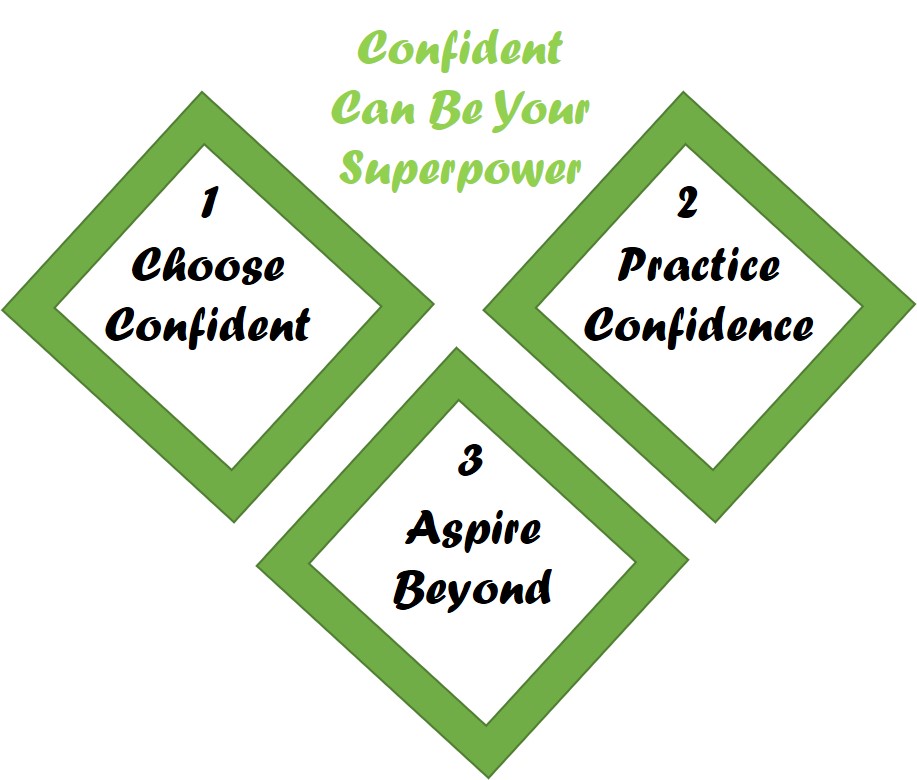
Imagine waking up one morning and deciding to choose ‘confident’ to be your superpower. How would you feel and what would you do if you approached life with confidence? How could you change your world?
You might be thinking that ‘confident’ could never be your superpower – but you’re wrong. If you choose it and practice it, you can become more confident – in a way that feels authentic, leads to a richer life and helps your career.
Exploring Confidence
This is the first of several articles that will explore what it means to choose confident to be your superpower, to practice confident behaviors, and apply it to work.
To get things started, this article will define confident, share some foundational research and present a three-stage approach used to improve confidence. Later articles will share practical actions you can take to bolster your confidence, case studies, links to related topics and research foundations.
This approach is based on my experience working with coaching clients from vastly different jobs, industries and backgrounds who shared one common trait – they lacked confidence. They reported that a lack of confidence resulted in them staying silent in key meetings, getting passed over for promotions, getting taken advantage of, becoming a target for bullying colleagues and more. Those were lousy outcomes!
Each of them wanted a change – they wanted to choose confident to describe them – and this approach helped.
Define Confident

What does ‘confident’ look like? Who comes to mind when you think of the word ‘confident’? Confidence is one of those things that is hard to describe, but you know it when you see it.
Merriam-Webster provided a formal definition of ‘confident’ as “full of conviction and having or showing assurance and self-reliance”.
That definition seemed rather dry and uninspiring, so I searched some more. I came across this definition on a website dedicated to kids’ health:
“Confidence means feeling sure of yourself and your abilities — not in an arrogant way, but in a realistic, secure way. Confidence isn’t about feeling superior to others. It’s a quiet inner knowledge that you’re capable.”
That definition captures true confidence!
It highlights the feeling of self-assurance but balances it by pointing out that confidence is not arrogance. Since it is “a quiet inner knowledge”, every person can choose how to display confidence.
For some people confidence means taking control in a loud and assertive way. For others, confidence means making choices about how and when to get involved by following their own ideas and beliefs.
This definition leaves room for you to find and display confidence in a way that is authentic for you.
Choosing and Practicing
People are not born with a set amount of confidence – that trait grows and changes based on our natural tendencies and experiences.
That’s good news! It means that anyone can learn to be more confident. Like any other skill, it can be practiced and learned. Learning confidence requires two things to get started: choosing and practicing. Practicing, so you can be prepared, gives you the behaviors and skills to display confidence. Check out this quote from Arthur Ashe:
“One important key to success is self-confidence. An important key to self-confidence is preparation.” -Arthur Ashe
Let’s look at some evidence that confidence can be learned through practice.
Research on Practicing Confidence
For centuries philosophers and scientists have debated about whether or not traits like confidence are set and unchangeable from birth or can be learned. We’ll dive into that research in the future. For now, let me point out two key ideas that set a foundation for my approach to practicing confidence.

Idea 1: Confidence can be learned. In his Harvard Business Review article What Makes a Leader?, Daniel Goleman explains how emotional intelligence (EI) – including confidence – are critical to success as a leader. He definitively states that EI skills like confidence can be learned and developed through life experiences and intentional practice.
Idea 2: Learning works best through on-the-job practice. Similarly, a research study in the Personnel Psychology journal showed that practicing new skills related to leadership and emotional intelligence on the job (developmental job challenges) could improve effectiveness and promotability. Their findings indicate that people don’t need expensive and complicated training programs to learn skills like confidence. Instead, they can practice leadership skills by trying new approaches, techniques and behaviors in their everyday work. Read more about this study in an earlier post Research Shows Which Experiences Really Work to Develop Leaders.
Coaching for Confidence
We’ve established what confidence is and considered research that shows that it can be learned through everyday practice on the job. Now, let’s put that knowledge into action.
In my coaching work, I regularly listen to clients describe confidence issues that range from not speaking up in meetings to avoiding key leadership decisions out of a sense of uncertainty. This shows up across a spectrum of clients – early career and later career, male and female, different industries and professions, and different education levels.
I’ve been surprised at how ubiquitous the problem can be and concerned about how it causes stress, damages careers and also robs organizations of key input. Working with clients, I’ve been using this three-stage approach to developing confidence.
3 Stage Approach to Develop Confidence

Stage 1: Choose Confidence. To become more confident, you must choose it! You must intentionally decide to work on it through practice. This stage involves making that choice and changing your mindset. With many clients, changing their mindset means helping them understand that they are unique and bring a value to work and the world that deserves to be shared. They must believe they are valuable in order to be worthy of being confident.
Stage 2: Practice Confidence. Once you accept that you are worthy of being confident, you must practice confident behaviors. You can start with small changes, get comfortable and then move on to bigger ones. Build your confident behaviors over time and they will start to feel natural to you. With your intentional practice, you should also stay aware of balance. Make sure that assertive confidence does not turn into aggression and that you consider situations and politics as you practice.
Stage 3: Aspire Beyond. Once you practice your way into being more confident, you can plan a bigger life and pursue goals that are important to you. Target new career opportunities. Explore different interests. Advocate for yourself. Be the best you possible. All possibilities are open to you when you believe in yourself.
With this approach, you can choose confident to be your superpower.
References
Goleman, Daniel. (1998). What Makes a Leader? Harvard Business Review. Check out this 7 minute video overview of the article: https://hbr.org/video/5236216251001/what-makes-a-leader
Seibert, S.E., Sargent L.D., Kraimer M., Kiazad, K. (2017) “Linking Developmental Experiences to Leader Effectiveness and Promotability: The Mediating Role of Leadership and Self-efficacy and Mentor Network”, Personnel Psychology, Vol 70, 357-397.



